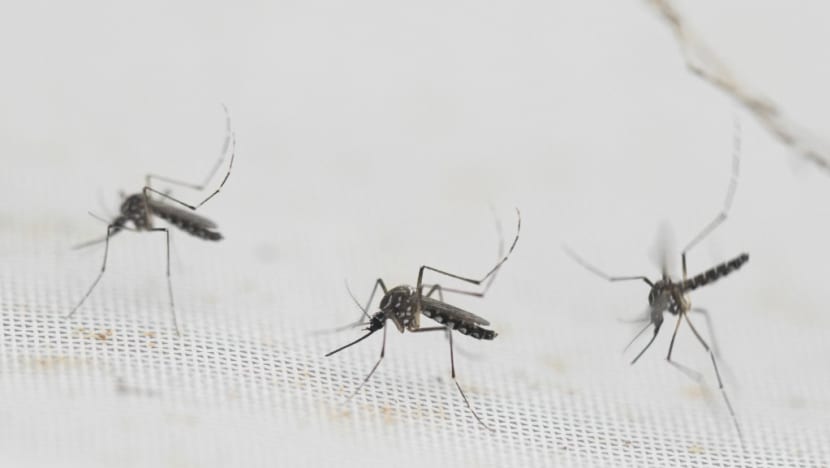Dengue patients have higher risk of long-term complications than COVID-19 patients: NTU study
Infectious diseases experts told CNA that the health complications flagged in the study are often the result of pre-existing conditions.

Aedes aegypti mosquitoes are pictured at a laboratory. (File photo: AFP/Luis Robayo)

This audio is generated by an AI tool.
SINGAPORE: People who recovered from dengue are more likely to face long-term health complications, including heart conditions and memory disorders, compared with those who contracted COVID-19.
These were the findings from a nationwide study released on Monday (Aug 26).
Dengue patients have a 55 per cent higher risk of heart complications such as irregular heartbeats, heart disease, and blood clots, according to the study led by Nanyang Technological University (NTU) researchers.
Those who contracted dengue also face a 213 per cent increased risk of cognition or memory disorders, along with a 198 per cent higher risk of movement disorders.
Dengue has no known cure or treatment. It is also called “breakbone fever” because of the severe muscle and joint pains that occur during infection, as well as high fever.
“We were motivated to conduct the study due to the increasing geographic range of dengue due to climate change,” said the study’s lead author, Assistant Professor Lim Jue Tao from NTU’s Lee Kong Chian School of Medicine.
His research team also decided to compare the results against those who had COVID-19, as its previous work suggested an elevated risk of similar long-term health complications.
“Overall, our study underscores the need for people to guard against dengue in their environment and can be a resource to support public health planning,” added Asst Prof Lim.
The study was first published in in the Journal of Travel Medicine in July.
FIRST-OF-ITS-KIND STUDY
The study involved looking at tests and medical claim records of 11,707 Singapore residents with dengue, as well as about 1.2 million residents who contracted the coronavirus, between July 2021 and October 2022.
It is the first to examine the long-term risk of multiple health complications following dengue, and the first to contrast the post-recovery risk of dengue and COVID-19 patients.
The team looked for newly arising health problems related to the heart, neurological and immune system that appeared 31 to 300 days after the infection.
However, the researchers noted limitations to the study, including being able to track only adults aged 18 and older. This means the findings cannot be generalised to younger patients.
Individuals’ susceptibility to COVID-19 and dengue – such as genetic, behavioural, or environmental factors, which can influence risk estimates – were also not considered.
In the future, the research team will compare the risk of long-term health complications across the four different dengue serotypes, with the economic costs incurred from these complications.
The team also comprised researchers from the Ministry of Health (MOH), Singapore General Hospital, the National Centre for Infectious Diseases, and the National Environment Agency.
UNDERLYING CONDITIONS
Infectious diseases experts told CNA that the health complications flagged in the study are often the result of pre-existing conditions.
“If they know that they have heart or other chronic diseases before they get dengue, then it's good to at least consult with a doctor on how to best to follow up on those conditions,” said Professor Ooi Eng Eong from the Signature Research Programme in Emerging Infectious Diseases at Duke-NUS Medical School.
Prof Ooi added that such underlying conditions will likely worsen the problem, which means it is worth a closer follow-up.
Given that efforts to keep transmission rates low in the community can only go so far, Prof Ooi pointed out that a two-pronged approach is required: Keeping the mosquito population low, coupled with vaccination to potentially reduce the risks of developing complications.
Only one dengue vaccine, called Dengvaxia, has been approved in Singapore for those aged 12 to 45 who have previously been infected with dengue.
Those who have not contracted dengue before are not advised to get the vaccine. This is due to an increased risk of developing severe dengue if they get infected later in life, according to MOH.
Prof Ooi pointed out that Singapore’s low rates of long COVID-19, compared with other countries like the United States, are due to its high vaccination rates.
“We have a unique situation where our severe dengue cases are (among) older adults, and I think there, we can actually make a difference with vaccination,” he told CNA’s Singapore Tonight programme.












.png?itok=KBdatgH6)





